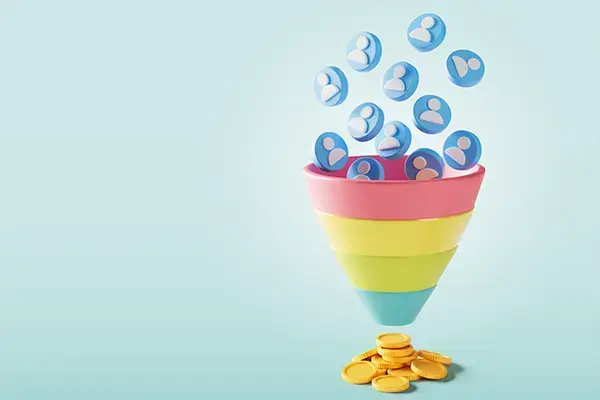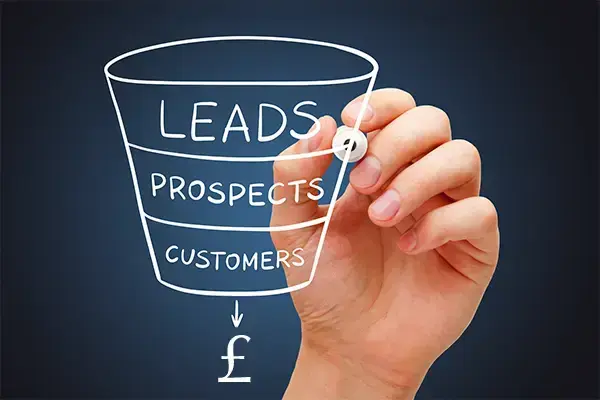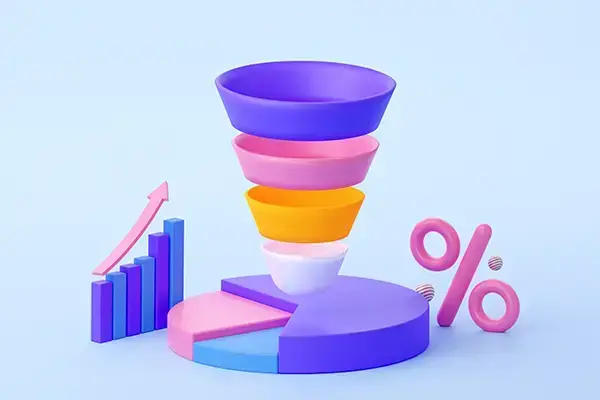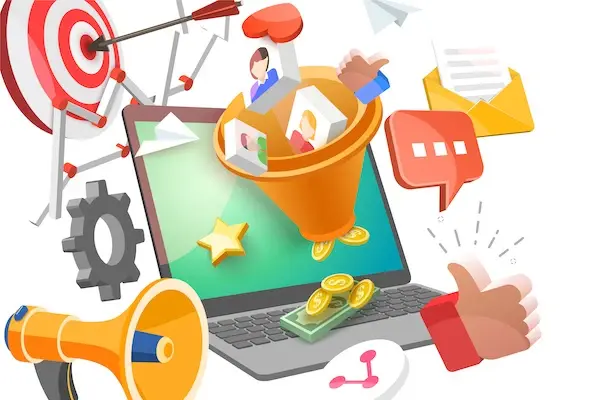In today’s digital era, the importance of having an online presence cannot be overstated. However, it’s not enough to just have a website. To maximize your online success, it is crucial to understand and leverage the concept of sales funnels.
A Tech Virtual Assistant (VA) can be your secret weapon in this regard, helping you create and maintain an effective sales funnel for your business.
What is a Sales Funnel?
A sales funnel is a marketing concept that represents the journey a potential customer goes through from the moment they become aware of your product or service until they make a purchase. It is called a “funnel” because it narrows down at each stage, with fewer people progressing through the entire process.
The sales funnel can be divided into four main stages:
The sales funnel is an integral part of any marketing strategy, as it guides potential new customers through the various stages of their buying journey. By understanding and optimizing each stage, businesses can significantly improve their conversion rates and build lasting relationships with their customers.
Let’s dive deeper into the different stages of the sales funnel:

Awareness Stage
The Awareness stage is the point at which potential customers first encounter your brand, product, or service. In this stage of the sales cycle, your primary goal is to attract their attention and pique their interest. To do this, you should focus on the following:
- Content marketing: Create high-quality, informative, and engaging content, such as blog posts, articles, videos, and social media posts, to reach your target audience and generate awareness about your brand.
- Search Engine Optimization (SEO): Optimize your website and content to rank higher on search engine results pages, making it easier for potential customers to discover your business.
- Advertising: Run targeted ad campaigns on platforms like Google Ads, Facebook, Instagram, and LinkedIn to reach a wider audience and create brand awareness.
- Public relations (PR): Use press releases, media coverage, and influencer collaborations to establish credibility and attract attention to your business.
Interest Stage
Once potential paying customers are aware of your brand, they may become interested in learning more about your offerings. In the Interest stage, your goal is to nurture their curiosity and provide valuable information that will help them make informed decisions. To achieve this, consider the following:
- Lead magnets: Offer valuable content such as eBooks, whitepapers, webinars, or free trials in exchange for contact information, allowing you to capture leads and continue engaging with them.
- Email marketing: Send personalised and informative email campaigns to your leads, sharing valuable insights, product information, and relevant promotions.
- Social media engagement: Interact with your audience on social media platforms, answering questions, addressing concerns, and providing valuable content that showcases your expertise.
- Retargeting: Use retargeting ads to remind potential customers of your brand and products as they browse other websites, keeping you top-of-mind.
Decision Stage
In the Decision stage of the sales funnel, potential customers evaluate their options and compare your product or service to your competitors’. Your goal during this stage is to present a compelling offer that convinces them to choose your business. To do this, focus on:
- Product demonstrations: Offer product demos, webinars, or case studies to showcase your product’s features, benefits, and how it solves customers’ pain points.
- Testimonials and reviews: Showcase social proof through customer testimonials, reviews, and case studies to build trust and credibility.
- Special offers and promotions: Provide limited-time discounts, exclusive bundles, or free shipping to make your offer more enticing.
- Sales consultations: Offer personalised sales consultations or live chats to address any remaining questions or concerns, and guide leads towards making a purchase decision.
- Sales Pages: If using marketing automation then you should be funnelling people through to a sales page or directly onto a landing page with the sole aim of converting website visitors into paying customers.
Action Stage
At the Action stage, people are ready to make a purchase. Your goal here is to provide a seamless and convenient buying experience, ensuring they complete the transaction and become actual customers. To optimise the Action stage, consider the following:
- Streamlined checkout process: Simplify your website’s checkout process by minimizing the number of steps, offering guest checkout options, and providing multiple payment methods.
- Trust signals: Display trust badges, secure payment logos, and privacy policies to reassure customers that their personal information is safe.
- Customer support: Provide timely and efficient customer support through various channels, such as live chat, email, and phone, to address any issues or concerns during the purchasing process.
- Post-purchase follow-up: Send a thank-you email, order confirmation, and shipping updates to keep customers informed and show appreciation for their business.
By understanding and optimizing each stage of the sales funnel, businesses can create a more effective and targeted marketing strategy that ultimately leads to higher conversion rates and increased customer satisfaction. But the sales funnel doesn’t end with the Action stage; it’s essential to consider post-purchase engagement and customer retention efforts as well.
Post Purchase Engagement and Retention

After customers have made a purchase, it’s crucial to continue nurturing the relationship and encouraging repeat business or upselling additional products or services. This should form part of your sales process; with brand new customers you may have an onboarding process that automates this for you.
This could also mean that once someone becomes a customer, or a new sales funnel is created, all existing customers enter a different sales funnel. A strong post-purchase engagement strategy can lead to increased customer lifetime value, brand loyalty, and positive word-of-mouth.
One effective way to engage with customers after they have made a purchase is by sending personalized emails or messages, expressing gratitude for their purchase, asking for feedback, or suggesting relevant recommendations and promotions. This personalized touch helps to build a strong connection with your customers.
Another approach to maintain engagement with existing customers is by implementing loyalty programs that reward customers for repeat purchases or referrals. Such incentives motivate customers to continue interacting with your brand, visiting your website and engaging on social media, this helps to make them feel valued.
Encouraging customers to connect with your brand on social media platforms can also help foster a sense of community. By participating in online discussions, communities, or user-generated content campaigns, customers can deepen their relationship with your brand and feel more invested in your success.
It’s essential for any business to gather feedback from your customers through surveys, reviews, or testimonials. This information allows you to identify areas for improvement and tailor your offerings to better meet their needs and preferences.
By concentrating on each stage of the sales funnel and implementing these strategies, businesses can create a comprehensive and cohesive marketing plan that effectively guides customers through their buying journey. This approach not only leads to improved conversion rates and increased sales but also cultivates long-term relationships, ensuring sustainable growth for your business.
Why are Sales Funnels Important?
Website sales funnels and marketing automation plays a crucial role in the success of a business for a variety of reasons. One of the most significant benefits of implementing a well-designed sales funnel is the potential for improved conversion rates. When potential customers are guided through each stage of the funnel, they are more likely to make a purchase, ultimately leading to increased revenue for your business.
Sales funnels work and they often take someone from the very beginning of the funnel to purchase with little intervention, this means that you and your sales team only get involved at the point that someone is ready to be convinced to make a purchase. This mean that the sales team can focus on relationship building with new and existing customers.
As well as boosting conversion rates, a carefully crafted sales funnel can enhance the overall customer experience. By providing the right information and support at the appropriate time, customers feel more at ease and satisfied with their interactions with the various sales funnel stages and ultimately with your brand. This positive experience not only increases the chances of making a sale but also encourages customers to return and recommend your business to others.
Another compelling reason to invest in a sales funnel is the opportunity for data-driven marketing. By closely analysing the performance of your sales funnel, you can gain valuable insights into customer behaviour and preferences. This information allows you to fine-tune your marketing efforts, tailoring your approach to better align with your target audience’s needs and expectations. The result is a more efficient marketing strategy that yields improved results, ultimately contributing to the growth and success of your business.
What is the Difference Between a Sales Funnel and a Marketing Funnel?
Although the terms “marketing funnel” and “sales funnel” are sometimes used interchangeably, they refer to two distinct yet interconnected concepts in the world of business. Within this blog we have referred to the sales funnel, but in reality, this covers both areas.

Marketing Funnel:
The marketing funnel section is a broader concept that focuses on raising awareness, generating interest, and nurturing leads. It outlines the steps a potential customer takes from becoming aware of your brand to the point where they are ready to consider making a purchase. The marketing funnel is generally divided into the following stages:
- Awareness: In this stage, potential customers learn about your brand, products, or services through various marketing channels such as social media, content marketing, or advertising.
- Interest: Once potential customers are aware of your brand, they may become interested in learning more about your offerings. This stage involves providing valuable information to nurture their curiosity and engage them.
- Consideration: In the consideration stage, potential customers evaluate their options and compare your products or services to your competitors’. Your goal here is to position your brand as the best choice.
Sales Funnel:
The sales funnel picks up where the marketing funnel leaves off, focusing specifically on the process of converting potential customers into actual buyers. It outlines the steps a potential customer takes from the point of considering a purchase to the actual purchase and even beyond. The sales funnel typically includes the following stages:
- Decision: During this stage, potential customers decide whether or not to make a purchase. Your goal is to provide a compelling offer that convinces them to choose your product or service.
- Action: In the action stage, potential customers complete the transaction and become actual customers. Your focus here is to provide a seamless and convenient buying experience.
- Post-purchase engagement and retention: After customers have made a purchase, your goal is to continue nurturing the relationship and encouraging repeat business, fostering customer loyalty and long-term relationships.
So basically, the marketing funnel focuses on raising awareness, generating interest, and nurturing leads, while the sales funnel concentrates on converting those leads into customers and maintaining long-term relationships. Both funnels are interconnected, and together they provide a comprehensive view of the customer journey from initial awareness to repeat business. Understanding and optimizing all parts of the marketing and/or sales funnel is crucial for a successful marketing campaign and sales strategy that drives growth and customer satisfaction.
How a Tech VA Can Help
A Tech Virtual Assistant (VA) can be an invaluable asset for your business, playing a crucial role in helping you create and maintain an effective sales funnel.
A Tech VA can help you build your funnel from scratch, advising on the best software or technology to use, whether that’s for building a landing page, creating an email marketing campaign, creating lead magnets and freebies or installing a form on your website to capture email addresses. Each part of the funnel needs to be built and seamlessly integrate with one another, otherwise the whole sales funnel process will fail.
A Tech VA can also assist you in identifying your target audience. By pinpointing your ideal customer and creating customer personas, they ensure that your sales funnel is designed to cater to the specific needs and preferences of your target market. This tailored approach leads to more meaningful interactions with potential customers and, ultimately, higher conversion rates.
Once a clear understanding of your target audience has been established, a Tech VA can help you develop a comprehensive sales funnel strategy. This strategy encompasses all aspects of the sales funnel, from raising awareness about your brand, product, or service to encouraging repeat business and fostering long-term customer relationships. By taking a holistic approach, a Tech VA can ensure that your marketing efforts are cohesive and effective.

Creating engaging content is an essential component of a successful sales funnel, and a Tech VA can support you in this regard. At each stage of the funnel, customers will require different types of content to guide them through the buying process. A Tech VA can help you craft informative blog posts, captivating videos, and persuasive landing pages that resonate with your audience and drive them to the next stage of the funnel. This targeted content strategy helps to engage your audience and maintain their interest throughout their buying journey.
For any online business or indeed offline business with an online presence, having their own sales funnel that works alongside an email marketing campaign is an effective and often fully automated way of generating new leads and customers into their business.
There are all different types of sales funnels dependent on the type of business, whether it’s a product or service being offered, price point and the market that they operate in. For example, a business consultant will need sales funnels that look very different to the sales funnels set up for a double glazing company, even though the different sales funnel stages are the same.
The beauty of it, is that once your sales funnel has been created you only need to tweak it as you analyse the results, the hard work has already been done!
If you need help in creating and managing a sales funnel for your business to keep website visitors engaged and help move them along the four stages of the funnel, then please get in touch today to find out more.

